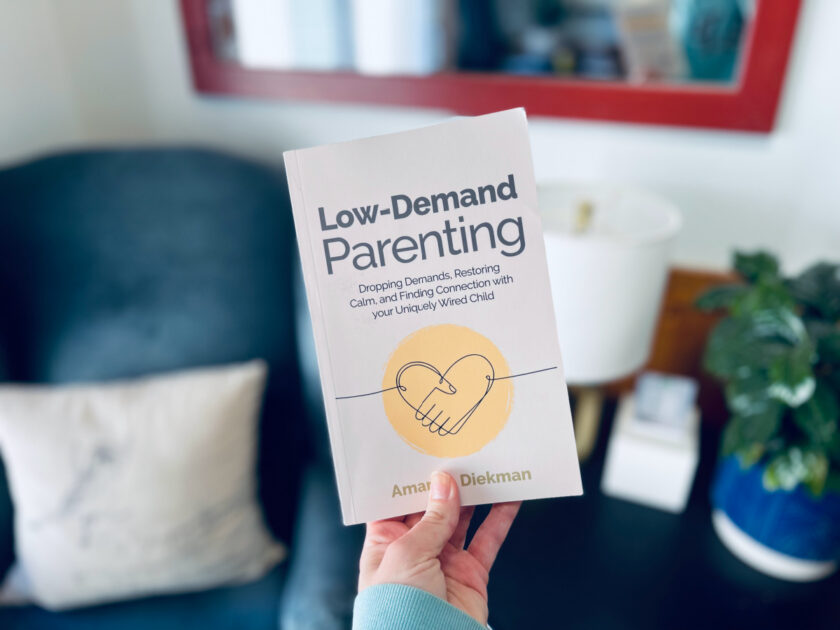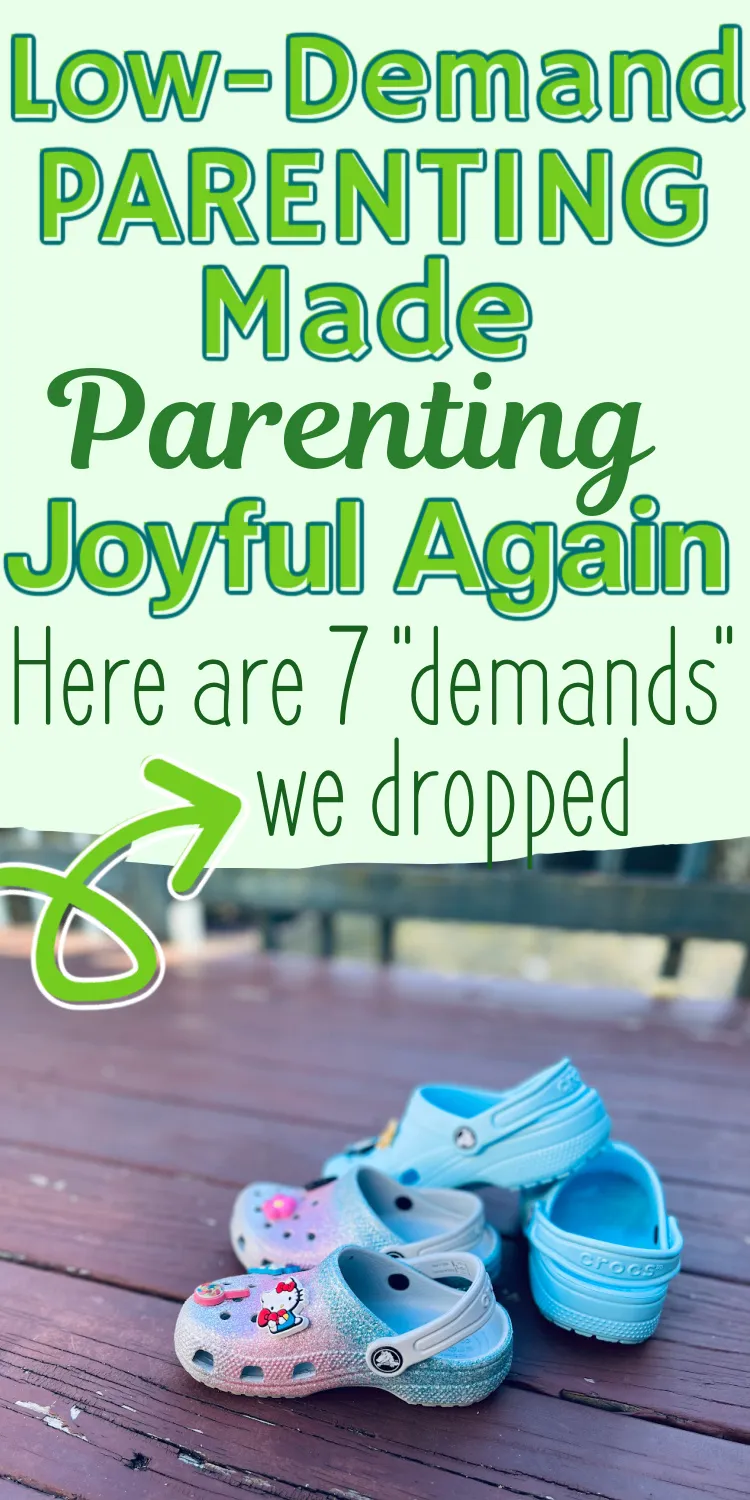Inside: The world tells us that good parents place a lot of demands on their children – it’s just part of being a good parent, they say. But depending on your child’s temperament, you might end up spending ALL of your energy enforcing those demands. Low-demand parenting offers a different path.
Last month, I picked up a copy of a book my husband recommended: Low-Demand Parenting by Amanda Diekman.
At the time, I wanted to learn more strategies for helping one of our kids who we think might have PDA (pathological demand avoidance OR persistent drive for autonomy).
The more pages I read, the more familiar it sounded.
Why? Because apparently we’ve been practicing low demand parenting long before it was a thing.
We have five kids, most of which are either super strong-willed or have varying degrees of demand avoidance. Whatever you want to call it, most of them have questioned everything right from the start.
I fought the good fight for a few years, keeping up with all the things I thought I was supposed to do as a parent…until I came to terms with the fact that I had a limited amount of energy.
I could spend that energy doing all the things society and the church and even my own parents thought was “what good parents do” – and have none leftover to connect with my kids.
OR I could choose a new path, to sift through that [very] long list of demands and decide for myself what was actually essential.
So if you’re exhausted and burned out from trying to do everything you think good parents should do, maybe it’s time to consider what parenting demands you can drop.
Related: What Is Respectful Parenting? A (Sadly) Radical Philosophy

7 Demands We Dropped Years Before Low-Demand Parenting Was a Thing
This post probably contains affiliate links, which means I may earn a commission if you make a purchase through those links. As an Amazon Associate, I earn from qualifying purchases. You can find our full disclosure HERE.
Low demand parenting means dropping demands and reducing expectations in order to meet our kids with radical acceptance. The purpose of the low demand life is to find ease and joy.
Amanda Diekman, Author of Low-Demand Parenting
Low-demand parenting was originally developed to support children with PDA, and I did pick up on a few new to me strategies in her book, particularly around using declarative language (a.k.a. fewer questions).
But what if low-demand parenting has something to offer ALL families, not just families with PDA kids?
Our culture holds “the assumption that ‘parenting’ means making your child do things” (Naomi Fisher, Think Again) – from what to eat to how many chores to do and when to do them to spending time outside or reading. It’s a long list.
But what if parenting doesn’t have to be that way? What if we could work collaboratively with our children to find solutions that work for everyone?
What if we could be flexible? And what if we could drop so many of the typical parenting demands?
(For adults, having more control over your life correlates to being healthier and happier. Why do we assume kids are any different? P.S. That’s called “adultism”.)
Dropping these seven demands dramatically reduced the amount of stress and exhaustion I experienced as a parent. I finally had energy to connect with my kids, to learn more about them and appreciate their unique selves, and to build a strong relationship with them.
And I decided that having energy to do all of that was way more important than where my kids ate their dinner or whether or not they kept their shoes on at the park.
You Might Also Like: Conventional Parenting Advice You Don’t Need to Follow (Unless You Want To)
1. All but the most essential clothing and shoe-wearing demands.
It all started with shoes. From the beginning, I was that mom at the park.
You know the one: the one who lets her children take their shoes off (I can feel your glare from across the park). Then your kids are asking you why they can’t take their shoes off, too.
Unless I was certain it wasn’t safe, it never made sense to make my kids keep their shoes on. They would ditch them the moment we got to the park.
It was easier to climb the slide. Easier to hang onto bars upside down like a monkey.
So why not let them take their shoes off? Why not?
And why couldn’t they wear two different patterns that in my opinion, didn’t really match? Because I was embarrassed?
Well then, why was I embarrassed? Why did I feel the need to control their clothing choices?
Why did they need to wear their heavy coats if they told me they were hot? Could I not bring their coats in case they get cold?
Fast forward to today, the only time we make a clothing demand is when it’s legitimately unsafe for them to wear/not wear certain clothing items – like, yes, you must wear clothes outside of the house.
(As our girls have gotten older, this has involved unpacking a LOT of purity culture assumptions and patriarchal mandates around women’s undergarments especially. Sooooo much fun.)
You Might Also Like: 30 Laid Back Spring Bucket List Ideas for Tired Parents
2. School and traditional homeschooling.
Years ago, when I first started homeschooling, I thought I would give the traditional homeschool path a try.
We had a phonics workbook leftover from the University Model School (part-time school and homeschool) she attended the year before. Might as well start with something we already had…right?
Wrong.
I asked her to do just one page of the workbook. She chose to sit and stare out the window for forty-five minutes, instead.
Her body language said, “Thanks, but no thanks, mom. I’m not doing it.”
After that experience, I quickly learned that I could try to force her to do things, but it would very quickly break our relationship. And I quickly realized that I didn’t need to!
Kids are born curious and hard-wired to learn. They will learn all day every day without forced teaching or structured adult-chosen curriculum.
We started down the long winding road to unschooling that day, calling it relaxed homeschooling for years before fully taking the leap into 100% self-directed education. We did activities she was happy to do – mostly reading aloud – and let her pursue her own interests.
You Might Also Like: Unschooling vs. Homeschooling – What’s the Difference?
3. Arbitrary bedtimes.
My oldest also never conformed to traditional bedtimes.
We would try to get her to bed by a certain time, and she would lie awake for an hour or two. Every single night for YEARS.
The year we tried the University Model school, getting her out of bed to get to school by a certain time was torture. To this day, she’s still a night owl.
We did finally figure out the gift that is melatonin for kids that truly need it, but she would find it extremely difficult to conform to a school schedule.
Especially since high schools typically start EARLIER than elementary schools, just when teenagers’ bodies naturally shift to a late bedtime schedule. (Make it make sense!)
We always get the question, “But how will they ever learn to wake up for a job?”
To which I respond…“You know there are certain jobs with every kind of shift, right? Night shifts, day shifts, afternoon shifts?”
But what if you, the parent, need a different bedtime? In our home, we compromise.
The youngest children who rely on me for their bedtime routine, I found a time that worked with their rhythm and mine. I call them at a certain time to start reading and bedtime, and because they love reading with me, it’s not a problem.
4. Arbitrary screen time limits.
There is an insane amount of fear around screen time for kids today. I’m starting to think it occupies 75% of parents’ brain space.
But does it really have to? Do we really need strict screen time limits?
I asked those questions three years ago and came up to the shocking conclusion: I don’t think we do.
Maybe fears around screen time (amount, not content) are just as unwarranted as fears around books when they first became easily accessible to the public?
Since the industrial revolution, adults have sought to control children’s free time. Is what they are doing “productive”? Shouldn’t they be doing this instead of that?
While we still monitor content to keep our kids safe, we decided to let go of arbitrary screen time limits three years ago, and I’m so glad we did.
Related: 7 Guiding Principles for Parents Who Are Letting Go of Screen Limits
5. Meals at specific times and places.
Since I was a child, I preferred to eat in silence with a book. We still had family dinners, but quite honestly, to this day, I would rather read a book while I eat most days.
So why was I forcing my children to sit at the table, all together, with very set meal times? When they might not be hungry? When they might prefer to eat in solitude?
Especially when many of us have sensory issues where it’s just too loud to enjoy a big family dinner?
And why was I worried about food being eaten in the living room or family room?
I vacuum once a week. We have washable couch cushion covers, so why not let them sit on the comfy couch, instead?
We might have family dinner a few times a month, but definitely not every day. And I don’t enforce where food can or can’t go, although I do ask for precautions depending on the food (old throw blankets thrown over the couch).
We are also together all day, almost every day, so family dinner isn’t a necessity. We also prefer connecting with each other in small groups – it’s less overwhelming.
(We let go of a LOT of control around food. Read more about food autonomy for kids HERE.)
6. Tons of chores.
I loathed chore charts from the start. Why? Because chore charts are as much of a demand for kids as they are for parents.
I ditched chore charts a long time ago, and we negotiated a simple daily chore around something any kid can very obviously see is important: dishes.
We all like to have clean dishes to eat on, and being a big family, we go through them VERY quickly. The dishwasher needs to be run every night if we want to eat the next day.
So every kid has a dishes-related job:
- Clearing counters and loading the dishwasher.
- Hand-washing pots and pans.
- Emptying the dishwasher.
- Gathering dishes at the end of the day.
That’s it. One chore.
Oh yeah, and when they turn 9, they start doing their own laundry with a lot of mom support the first year.
I don’t require bed-making (I don’t make mine – seems hypocritical to make them). I don’t require putting clothes away – they can sit in a basket if that’s what they want to do.
I don’t even require regular room cleaning. My oldest initiated a deep clean of her own room once a month all on her own, and I will periodically help clean the other bedrooms.
It works for us.
You Might Also Like: Should Kids Do Chores? A Healthier Approach for Tired Parents
7. Sleeping in your own bed.
From the second we moved her out of her crib, my oldest wanted to sleep in our bed. Every night at 2 a.m. on the dot, she would wake up and come to my bed.
Because I thought all good parents make their kids sleep in their own bed, I would walk her back to her bed. I would lay with her and often sleep there until morning.
At various points, I tried everything from punishments to rewards to make her sleep in her bed on her own. Nothing worked.
I wish I would have known from the start that co-sleeping was an option. As partnered adults, we don’t like to sleep alone (or do we?), so why do we expect our kids to?
I co-slept with my last two kids, and we set up our master bedroom to accommodate it with two full beds side by side.
I transitioned my fourth child to his own bed around 2.5 (in a room with a sibling) because I was having child #5.
I had no plans to kick child #5 out of my bed, but once I set up a bed for her and told her she could have it whenever she wanted it, she moved out. That night!
So if you co-sleep, no, they won’t sleep with you forever. They will move out when they’re ready, just like they potty train when they’re ready and crawl when they’re reading, etc. etc.

You Can Drop Demands, And Still Be a Good Parent – Promise
We still hold our kids to a few core demands. Most of those demands revolve around respecting and taking care of yourself, others and property (to a certain extent – accidents happen).
We focus on raising kind, curious humans, on preparing them to deal with interpersonal conflict, on allowing them to learn what makes them tick and develop habits that match their unique bodies and personalities.
Society gives us a mile long list of all the things we need to do to be a good parent, and many of those things? They involve micro-managing every aspect of your children’s lives.
No wonder parents are exhausted! Control takes an ENORMOUS amount of energy, and we only have so much to go around.
So if you feel like you’re drowning right now and you want to drop some of these demands, but the world is telling you, “Don’t do it,” I’m going to be the voice on the other side telling you that yes, you can drop them.
Use your finite parenting energy to hold to a few core boundaries/demands and let the rest go. Prioritize trust and connection, instead.
Because at the end of the day, that’s what being a good parent is all about.
(Especially if you suspect your child has PDA, grab a copy of Amanda’s book HERE.)
What mainstream parenting demands have you dropped? Share in the comments!
Read Next: 5 Respectful Parenting Books I Wish I’d Read Years Ago



I am a mom of 7 living children (my eldest passed away 4 years ago) I also Home educates, and I lean toward this philosophy as well. I do and have done most of these things to create low demand parenting and respectful parenting in our home. We also don’t celebrate the mainstream holidays. We have low key birthday occasions. I whole heartily agree to head to authoritative parenting and ditch authoritarian as fast as possible. I am trying to show this as very win-win for us all.
Thanks for sharing Amber! I do think homeschooling definitely lends itself a little more to low-demand parenting (I can’t imagine stressing about waking my kids up for school and bedtimes related to that), but it can be adapted for parents with kids in school, too.